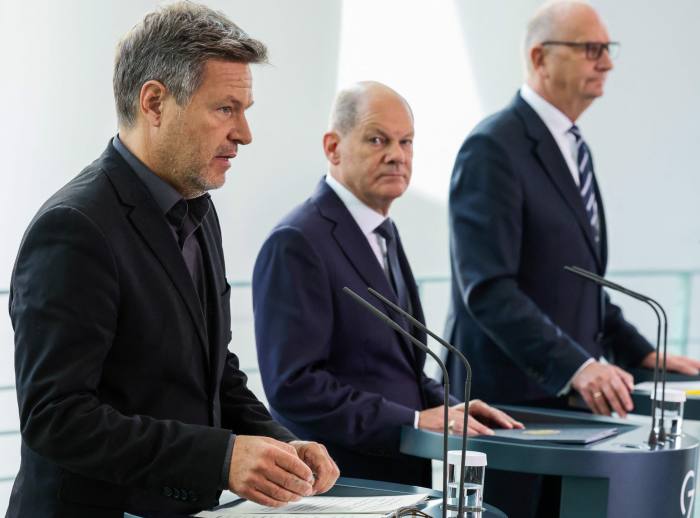
The German government has taken control of three refineries owned by Russian oil company Rosneft, in an escalation of the energy war between Moscow and the west triggered by Russia’s invasion of Ukraine.
Chancellor Olaf Scholz said his government had not taken the step lightly, but that “it was unavoidable”.
“We have known for a long time that Russia is no longer a reliable energy supplier,” he said on Friday. “That’s why it’s important to do everything we can now to safeguard Germany’s energy supply.”
The move is part of efforts by the government to protect the German economy from the effects of an EU-wide embargo on Russian crude, which comes into effect on January 1 and is designed to deprive Russian president Vladimir Putin of revenues to fund the Ukraine war.
The move secures the future of PCK, a refinery owned by Rosneft in the north-eastern German town of Schwedt, which was expected to be hard hit by the looming oil embargo.
PCK sits atop the Druzhba pipeline, which carries crude about 4,000km from central Russia directly to Schwedt. Efforts by authorities to secure alternative supplies of oil for the refinery had been complicated by the fact that Rosneft is its majority owner, controlling 54 per cent of its shares.
“This is a far-reaching decision on energy policy aimed at protecting our country,” Scholz said. “We are making ourselves more independent of Russia and the decisions that are made someplace over there.”
A statement issued by the German economy ministry on Friday said the government was placing Rosneft Deutschland GmbH and RN Refining & Marketing GmbH under the trusteeship of the Bundesnetzagentur (BNA), the country’s federal energy regulator.
That puts Rosneft’s stakes in three German refineries — PCK in Schwedt, MiRo in Karlsruhe and Bayernoil in the Bavarian town of Vohburg — under the BNA’s control. Rosneft accounts for about 12 per cent of Germany’s oil refining capacity, making it one of the largest oil processing companies in the country, the ministry said.

The move on Rosneft’s assets was seen as likely after Germany amended a key energy law in August allowing the government to place companies with “infrastructure critical to Germany’s security of supply” under temporary trusteeship. The law stipulated that as a last resort, the government could even expropriate such companies.
The decision to seize control of Rosneft’s assets mirrored a move in April, when the government placed Gazprom Germania, the German subsidiary of Kremlin-controlled gas exporter Gazprom, under BNA trusteeship. The assets of the company, which has now been renamed SEFE, include Germany’s largest gas storage facility, Rehden.
The move on Rosneft is the latest in a string of measures by the German government to deal with the chaos caused by Russia’s war in Ukraine, which has driven European gas and electricity prices to record levels.
Germany has accused the Kremlin of “weaponising” its energy exports to Europe by throttling the flow of gas through the Nord Stream 1 pipeline between Russia and Germany.
As gas supplies dwindled, Berlin moved to bail out Uniper, the country’s largest importer of Russian gas, which has been pushed to the brink of insolvency. Uniper said this week that the government could increase its stake in the company to more than 50 per cent.
The economy ministry said that by placing Rosneft’s German assets under trusteeship, “we are countering the threat to the security of [Germany’s] energy supply and setting an essential foundation stone for the preservation and future of the Schwedt site”.
The government said it had been forced to intervene because the Russian ownership of the refineries had placed their business operations “in danger”.
“Key, critical service providers such as suppliers, insurance companies, banks, IT companies, but also customers, were no longer prepared to work with Rosneft — not with refineries where Rosneft is a shareholder, nor with its Russian subsidiaries RDG and RNRM,” the economy ministry said.
PCK, which has a workforce of 1,200, is the main supplier of petrol, diesel, jet kerosene and fuel oil to Berlin and the surrounding region, Brandenburg, and is seen as a key element of eastern Germany’s energy infrastructure.
Many Schwedt residents began to fear for the future of the refinery after Germany signed up to the EU’s oil embargo and voluntarily committed to wind down its use of Russian crude imported via Druzhba by the end of the year.
The pipeline has a temporary exemption that allows some countries on the line — such as Hungary, Slovakia and the Czech Republic — to continue receiving Russian supplies beyond December, but Germany and Poland have effectively opted out of using it after 2022.
The government said it would invest €825mn over the next 15 years in PCK and the region surrounding it to safeguard its economic future and turn the plant into a “green refinery”. “Today . . . marks the beginning of Schwedt’s carbon-neutral transformation,” said Dietmar Woidke, governor of Brandenburg.
There are also plans for a €400mn upgrade of the oil pipeline running from the Baltic Sea port of Rostock to Schwedt, which could provide an alternative supply to that of Druzhba. A plan is in place to increase the flow of oil through the Rostock line from 5mn to 7mn tonnes a year at present to 9mn tonnes, which would allow PCK to operate at 75 per cent capacity.
Germany is also in talks with Poland to supply PCK with oil via the Polish port of Gdansk. Warsaw had originally been unwilling to provide oil to a refinery owned and controlled by Rosneft. Robert Habeck, the German economy minister, said talks with Poland were now “well advanced”.

